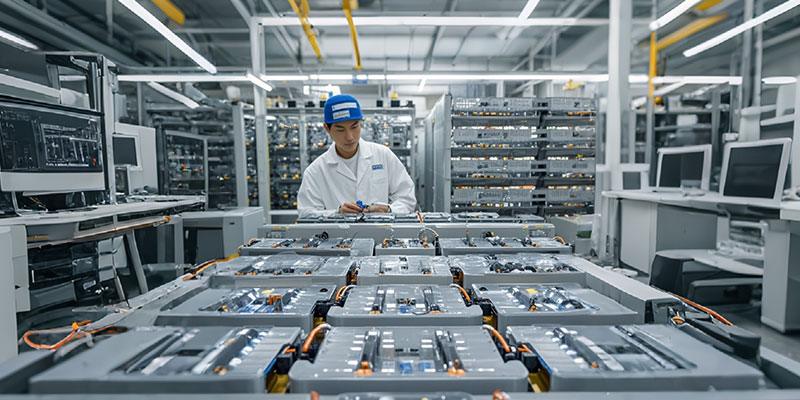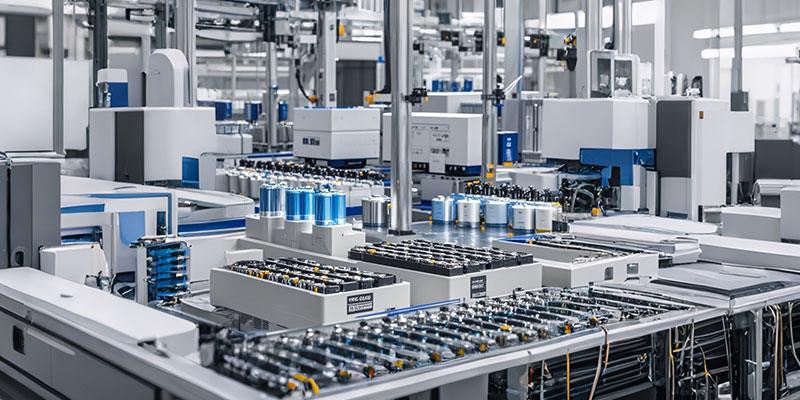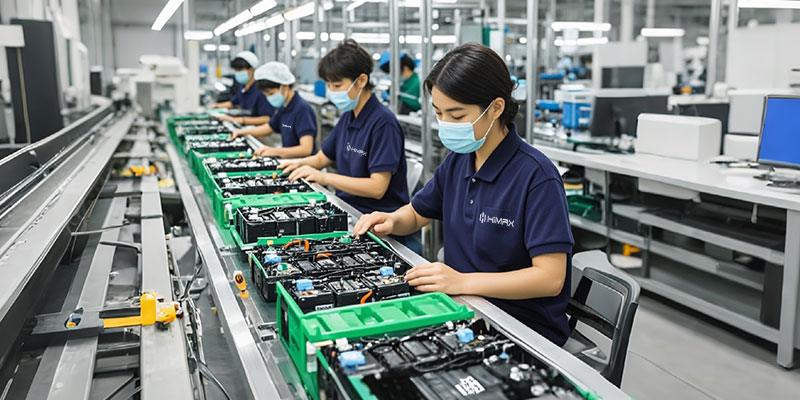Introduction
Lithium Iron Phosphate (LiFePO4) batteries have rapidly gained popularity across various industries, including electric vehicles (EVs), renewable energy storage, and industrial applications. Known for their safety, long lifespan, and environmental benefits, these batteries are now a preferred choice for businesses looking to enhance their product offerings. However, finding a reliable LiFePO4 battery exporter is crucial to ensuring consistent product quality, timely delivery, and long-term business success.
In this comprehensive guide, we will walk you through the key factors to consider when selecting a trustworthy LiFePO4 battery exporter. From evaluating certifications and product quality to assessing production capacity and technical support, this article will provide you with the insights you need to make informed decisions.
- Exporter Certifications and Compliance
One of the first steps in finding a reliable LiFePO4 battery exporter is ensuring that the supplier meets the necessary certifications and industry standards. Certifications not only serve as a benchmark for product quality but also ensure that the batteries comply with international safety and environmental regulations. Without these certifications, your business could face shipping delays, regulatory fines, or even bans from certain markets.

Key Certifications to Look For:
- ISO 9001:This certification indicates that the exporter follows a robust quality management system, ensuring consistency and quality across their manufacturing processes.
- UN 38.3:For shipping lithium batteries internationally, this certification is critical as it confirms that the batteries have passed rigorous safety tests for air transport.
- CE Marking:For businesses operating in Europe, CE certification ensures that products meet European safety, health, and environmental protection standards.
- UL Certification:In North America, UL certification is essential to ensure that batteries meet safety standards for various applications.
- RoHS Compliance:This directive restricts the use of hazardous materials in electrical and electronic products, which is important for businesses that prioritize sustainability.
Why Certifications Matter: Working with a vendor that holds these certifications guarantees that their products meet international standards, reducing the risk of compliance issues. Additionally, certified products are more likely to be accepted by customers and regulatory bodies, allowing your business to operate smoothly across global markets.
- Evaluating Product Quality and Technical Capabilities
LiFePO4 batteries are favored for their superior performance and safety features, but not all batteries are created equal. When choosing an exporter, it is essential to evaluate the quality of their products to ensure they meet your business’s specific requirements. Poor-quality batteries can lead to product failures, customer dissatisfaction, and potential safety hazards, all of which can harm your brand reputation.
Key Product Quality Indicators:
- Battery Lifespan:High-quality LiFePO4 batteries should have a long cycle life, typically lasting between 2,000 to 5,000 charge cycles. This durability is one of the primary reasons these batteries are favored over other types.
- Energy Density and Capacity:Evaluate the energy density of the batteries to ensure they can store sufficient energy for their size. A higher energy density is critical for applications like electric vehicles, where maximizing power within a limited space is essential.
- Safety Features:Reliable LiFePO4 batteries come with built-in safety features such as overcharge protection, temperature control, and short-circuit prevention, minimizing the risk of accidents.
Technical Capabilities: In addition to product quality, the exporter’s technical expertise plays a significant role in ensuring long-term success. Choose exporters who offer technical support and customization services, as this allows you to tailor the batteries to your specific applications. For example, some businesses may require specific battery configurations or capacities to optimize performance, and a good exporter should have the flexibility to meet these needs.
How to Evaluate:
- Request Product Samples:One of the best ways to evaluate product quality is to request samples and perform in-house testing or third-party evaluations.
- Review Case Studies:Many reliable exporters provide case studies or client testimonials that highlight their product’s performance in real-world applications.
- Ask About Customization Options:A reliable exporter should offer customization services to meet the unique needs of your business. Whether you need a specific battery size, capacity, or voltage, the exporter should be able to accommodate these requirements.
- Assessing Production Capacity and Supply Chain Reliability
A critical consideration when choosing a LiFePO4 battery exporter is their production capacity and ability to deliver products consistently. A vendor with limited production capacity may struggle to meet your order volumes, resulting in delays and supply chain disruptions. To ensure a smooth business operation, it’s important to choose an exporter with sufficient capacity to fulfill both your current and future needs.
Key Factors to Consider:
- Manufacturing Scale:Verify the exporter’s manufacturing capabilities, including their production volume per month and scalability for larger orders. This is particularly important if you expect your business to grow or if you operate in a sector that experiences seasonal demand fluctuations.
- Lead Times:Inquire about the exporter’s lead times for different order sizes. A reliable exporter should have short and predictable lead times, ensuring that you can meet your own production deadlines without delays.
- Supply Chain Resilience:Disruptions in the supply chain can significantly impact your business, especially when sourcing from international exporters. Assess whether the exporter has contingency plans in place to mitigate risks such as material shortages, transportation delays, or geopolitical issues.
Global Supply Chain Networks: Given the international nature of the lithium battery industry, it’s crucial to work with an exporter who has a well-established global supply chain. This ensures that batteries can be shipped to various locations efficiently and without delays. Reliable exporters will also have strong relationships with logistics providers, which can help reduce shipping costs and improve delivery times.
- Price Competitiveness and Cost Efficiency
While price should not be the sole factor in selecting an exporter, it is undoubtedly an important consideration. Striking a balance between cost and quality is essential for ensuring profitability while maintaining the high standards of your products. A lower price may seem attractive initially, but it can come at the expense of product quality, leading to higher costs in the long run due to repairs, replacements, or lost business.
Cost vs. Quality: When comparing exporters, be sure to evaluate the total cost of ownership, which includes not just the purchase price but also the costs associated with warranties, shipping, maintenance, and potential downtime due to poor product performance. High-quality batteries may have a higher upfront cost, but their longer lifespan and better reliability can result in cost savings over time.
Long-Term Contracts and Bulk Pricing: For businesses that require large or recurring orders, negotiating long-term contracts with the exporter can lead to significant cost savings. Many exporters offer discounts for bulk purchases, which can improve cost efficiency and help your business maintain a healthy profit margin.
Value-Added Services: Some exporters provide additional value-added services, such as extended warranties, recycling programs, or technical training for your team. These services can enhance the overall value of the partnership and contribute to the long-term success of your business.
- Industry Experience and Reputation
Choosing an exporter with extensive experience in the LiFePO4 battery market can provide your business with numerous advantages. Experienced exporters are more likely to have well-established manufacturing processes, supply chain networks, and a deep understanding of the unique requirements of different industries. Furthermore, they are more capable of adapting to market changes and staying ahead of emerging trends.
How to Evaluate Industry Experience:
- Years in the Industry:Consider how long the exporter has been operating in the LiFePO4 battery market. Long-standing companies are more likely to have a proven track record of reliability and quality.
- Industry Specialization:Some exporters may specialize in specific applications, such as automotive, industrial, or renewable energy sectors. Partnering with an exporter that understands your specific industry needs can lead to better product performance and greater customer satisfaction.
Reputation in the Market: A vendor’s reputation is a strong indicator of their reliability and the quality of their products and services. Look for exporters with a solid reputation among their customers and within the industry.
How to Assess Reputation:
- Customer Reviews and Testimonials:Read reviews from other businesses that have worked with the exporter. Positive feedback from reputable companies is a good sign that the exporter is trustworthy.
- Case Studies and Success Stories:Many exporters showcase case studies or success stories from their clients, demonstrating how their products have been successfully integrated into various applications.
- Industry Awards and Certifications:Exporters that have received industry awards or have obtained certifications from reputable organizations are likely to be more reliable and offer higher-quality products.
- After-Sales Service and Support
The relationship with your exporter should not end once the batteries are delivered. Reliable after-sales service and support are crucial for maintaining long-term business success. A good exporter will provide ongoing assistance to ensure that the batteries continue to perform as expected and that any issues are addressed promptly.
Key After-Sales Services:
- Technical Support:Ensure that the exporter offers technical support to help you resolve any issues related to battery performance, installation, or integration.
- Warranty and Return Policies:Review the exporter’s warranty and return policies to ensure that they provide adequate coverage in case of product defects or failures.
- Maintenance and Replacement Services:Some exporters offer maintenance services to extend the lifespan of the batteries or provide replacement units when needed.
Global Service Network: For businesses operating in multiple regions, it is important to work with an exporter that has a global service network. This ensures that you can receive support and replacement parts quickly, regardless of your location.
Himax Electronics’ Advantage
Himax Electronics is a leading LiFePO4 battery exporter with years of experience in the industry. We pride ourselves on delivering high-quality, reliable battery solutions that meet the needs of businesses across various sectors. Our products are known for their long lifespan, superior safety features, and excellent energy efficiency, making them ideal for applications ranging from electric vehicles to renewable energy storage.
At Himax Electronics, we understand the importance of providing exceptional service and support. Our team of experts is available to offer technical assistance and customization options to ensure that our batteries meet your specific requirements. Additionally, we are committed to sustainability and compliance, ensuring that all of our products are certified to meet international standards such as ISO 9001, UN 38.3, and CE.
With a global supply chain and logistics network, Himax Electronics guarantees timely delivery and reliable service, no matter where your business is located. Partner with us to benefit from our industry expertise, innovative solutions, and dedication to customer satisfaction.

Conclusion
Finding a reliable LiFePO4 battery exporter requires careful consideration of several key factors, including product quality, certifications, production capacity, pricing, and after-sales support. By following the guidelines outlined in this article, your business can select an exporter that not only meets your immediate needs but also supports your long-term growth and success.

